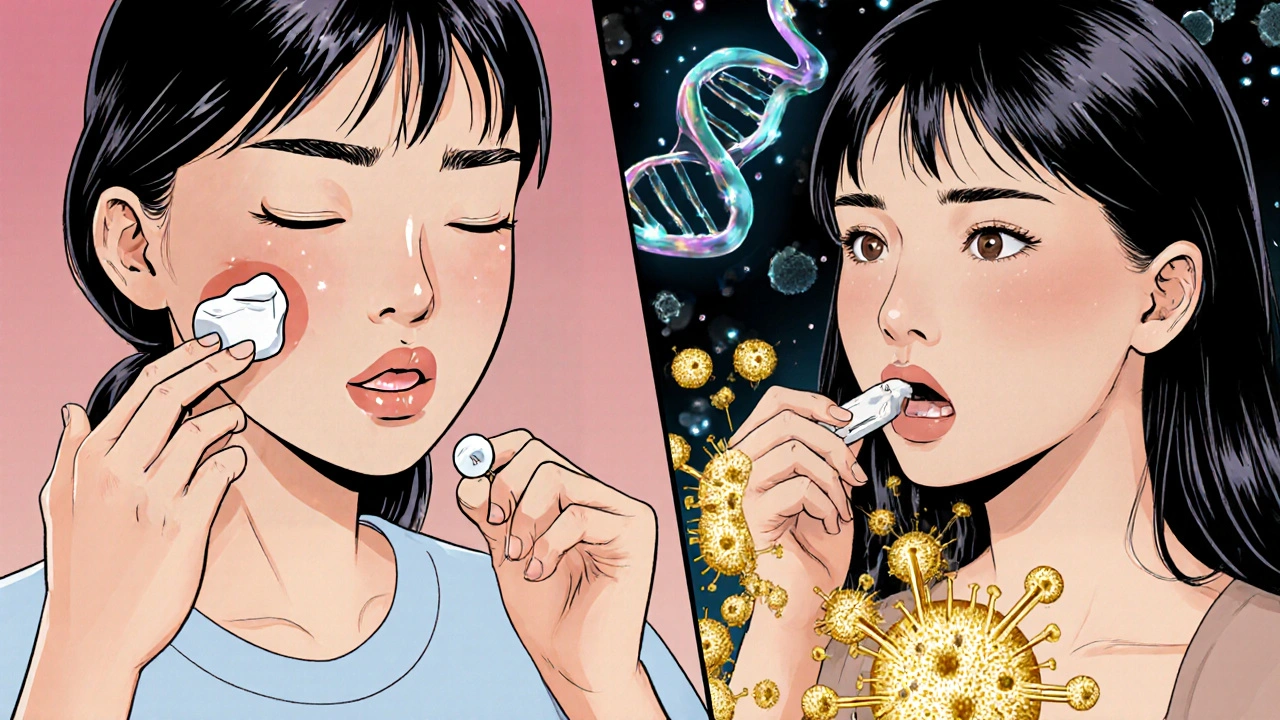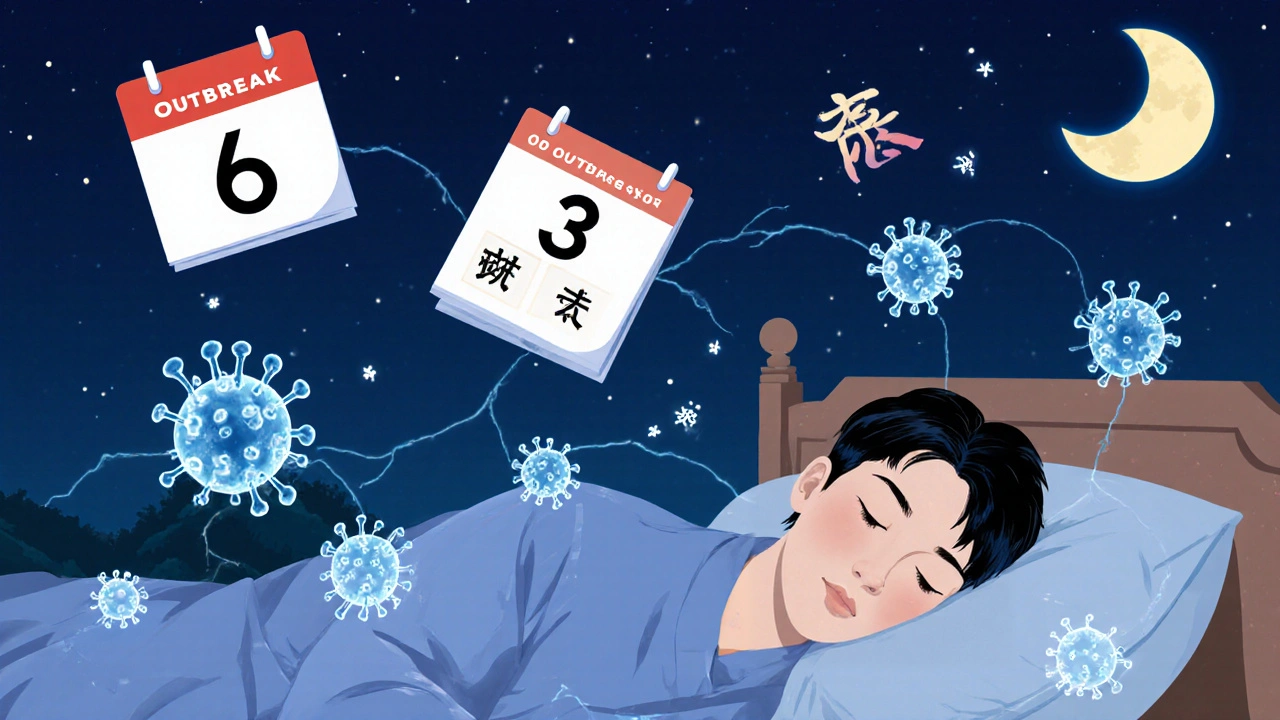Herpes simplex virus doesn’t go away once you have it. It hides in your nerves and comes back-sometimes as a tingling lip, sometimes as painful blisters in the genital area. You might think it’s just a rash or a bug bite, but if it keeps returning, it’s likely herpes simplex virus (HSV). And for millions of people, acyclovir is the most trusted tool to take control of it.
What Acyclovir Actually Does
Acyclovir isn’t a cure. It doesn’t kill the herpes virus or remove it from your body. Instead, it slows down how fast the virus multiplies. When you get an outbreak, HSV starts copying itself inside your skin cells. Acyclovir tricks the virus into using it as a building block instead of real DNA. The result? The virus can’t finish making new copies. It gets stuck. That’s why outbreaks shorten from 10 days to 5, and new sores often don’t form at all if you start early.
The drug works best when taken within 24 hours of the first sign-tingling, burning, or redness. Waiting longer cuts its effectiveness by half. Studies from the Journal of Infectious Diseases show people who took acyclovir within a day of symptoms had 50% fewer days of pain and healed 2 days faster than those who waited.
How It’s Used: Pills, Creams, and IVs
Acyclovir comes in three forms, each for different situations.
- Oral tablets (200 mg to 800 mg) are the most common. For first outbreaks, you take 200 mg five times a day for 7-10 days. For recurring outbreaks, it’s often 400 mg three times a day for 5 days.
- Topical cream (5%) is applied directly to cold sores. It helps a little, but studies show it’s not as strong as pills. It’s best for people who can’t take oral meds or want to reduce transmission to others.
- Intravenous (IV) acyclovir is used in hospitals for severe cases-like herpes encephalitis, newborn infections, or outbreaks in people with weakened immune systems.
Many people think the cream is enough. It’s not. The pill gets into your bloodstream and reaches nerves where the virus hides. The cream only touches the surface. For anything beyond a single cold sore, oral acyclovir is the standard.
When It’s Used: Outbreaks vs. Suppression
There are two main ways doctors use acyclovir: to treat outbreaks and to prevent them.
Treating outbreaks means taking it when you feel the warning signs. This is what most people do. It reduces pain, speeds healing, and lowers the chance you’ll spread the virus to others.
Suppressive therapy means taking it every day, even when you feel fine. This is for people who have six or more outbreaks a year. Research from the New England Journal of Medicine shows daily acyclovir cuts outbreaks by 70-80%. It also reduces asymptomatic shedding-the times when you’re contagious without symptoms-by up to 90%.
Suppression isn’t for everyone. It’s usually recommended for people with frequent outbreaks, those with partners who don’t have HSV, or anyone with a compromised immune system. Many people stop after a year, but some stay on it for years without side effects.

Side Effects and Safety
Most people tolerate acyclovir well. The most common side effects are mild: nausea, headache, or dizziness. These usually go away after a few days.
More serious side effects are rare but possible. Kidney problems can happen, especially in older adults or those already on other kidney-stressing drugs. Dehydration increases the risk. That’s why doctors tell you to drink water when taking it. If you notice changes in urination, swelling, or confusion, stop and call your doctor.
It’s safe during pregnancy. The CDC says acyclovir is classified as Category B-no evidence of harm in human studies. Many OB-GYNs prescribe it in the last month of pregnancy to prevent outbreaks during delivery, which can be dangerous for newborns.
It doesn’t interact badly with most medications. But if you’re on probenecid (for gout) or other antivirals like tenofovir, your dose might need adjusting. Always tell your doctor what else you’re taking.
How It Compares to Other Antivirals
Acyclovir isn’t the only option. Valacyclovir and famciclovir are similar drugs that work the same way but are easier to take.
| Drug | Dosing Frequency | Half-Life | Cost (30-day supply) | Best For |
|---|---|---|---|---|
| Acyclovir | 5 times daily | 2.5 hours | $15-$40 | Budget-friendly, first-line treatment |
| Valacyclovir | 2-3 times daily | 2-3 hours | $50-$100 | Convenience, suppression therapy |
| Famciclovir | 2-3 times daily | 2-4 hours | $60-$120 | Genital outbreaks, faster absorption |
Valacyclovir is just acyclovir with a different chemical wrapper. Your body converts it into acyclovir after you swallow it. That’s why it works better with fewer pills. But it’s more expensive. For most people, generic acyclovir is the smart choice-especially if you’re treating occasional outbreaks.
Famciclovir is slightly faster at reducing pain, but the difference is small. Unless you’re taking it daily and hate swallowing pills, acyclovir still holds its ground.
What Doesn’t Work
There are a lot of myths about herpes treatment.
- Lysine supplements don’t reliably prevent outbreaks. Some small studies show a tiny benefit, but nothing compared to acyclovir.
- Essential oils like tea tree or peppermint might soothe the skin, but they don’t stop the virus. In fact, some can irritate sores and make them worse.
- Alcohol or vinegar rinses won’t kill the virus inside your nerves. They just burn.
Don’t waste money on products that promise a “natural cure.” Acyclovir is one of the most studied antivirals in history. It’s been used since the 1980s. Over 100 million prescriptions are filled each year worldwide. That’s not luck. That’s science.

When to See a Doctor
You don’t need a prescription for acyclovir in every country, but you should still talk to a doctor before starting it.
See a provider if:
- This is your first outbreak and you’re not sure what it is
- You have more than 6 outbreaks a year
- The sores don’t heal after 10 days
- You have a weakened immune system from HIV, chemo, or transplant meds
- You’re pregnant or breastfeeding
Even if you’ve had herpes before, if something feels off-like fever, vision changes, or sores near your eyes-get checked. Herpes can spread to the cornea and cause permanent damage.
Real-Life Use: What Patients Say
One woman in Portland, 34, started taking acyclovir daily after her third genital outbreak in six months. She’d been avoiding sex, terrified of passing it on. After three months on suppressive therapy, she had zero outbreaks. She says, “It didn’t change my life. It just gave it back.”
A college student in Oregon used the cream only during outbreaks. He got 2-3 cold sores a year. After switching to oral acyclovir at the first tingle, his outbreaks dropped to once every 18 months. “I stopped hiding my face in photos,” he told his doctor.
These aren’t rare cases. They’re the norm.
Bottom Line
Acyclovir doesn’t erase herpes. But it gives you power over it. Whether you’re dealing with a single cold sore or frequent outbreaks, it’s the most reliable, affordable, and well-researched option available. Start it early. Take it as directed. Don’t let shame stop you from using it. Millions of people do-and live full, healthy lives because of it.
Can acyclovir cure herpes simplex virus?
No, acyclovir cannot cure herpes simplex virus. The virus remains in your nerve cells for life. Acyclovir works by slowing the virus’s ability to multiply during outbreaks, reducing symptoms, healing time, and transmission risk-but it doesn’t eliminate the virus from your body.
How long does it take for acyclovir to work on a cold sore?
If you start acyclovir within 24 hours of the first tingling or redness, you can expect to see improvement in 2-3 days. Full healing usually happens in 5-7 days, compared to 10-14 days without treatment. The sooner you begin, the better the results.
Is it safe to take acyclovir every day?
Yes, daily acyclovir is safe for long-term use. It’s commonly prescribed for people with frequent outbreaks (six or more per year). Studies show no major risks after years of use. The most common side effects are mild nausea or headache. Kidney function should be monitored in older adults or those with pre-existing kidney issues.
Can I take acyclovir while pregnant?
Yes, acyclovir is considered safe during pregnancy. The CDC classifies it as Category B, meaning no evidence of harm to the fetus in human studies. Many doctors prescribe it in the last month of pregnancy to prevent outbreaks during delivery, which can be dangerous for newborns.
Is acyclovir better than valacyclovir?
They work the same way-valacyclovir is converted into acyclovir in your body. Valacyclovir requires fewer daily doses, which makes it more convenient, especially for suppression therapy. But acyclovir is much cheaper and just as effective when taken as directed. For occasional outbreaks, acyclovir is often the better choice.
Can I spread herpes even if I’m taking acyclovir?
Yes, you can still spread herpes, but acyclovir reduces the risk significantly. Daily suppressive therapy lowers asymptomatic shedding by up to 90%. However, transmission is still possible during outbreaks or even without symptoms. Using condoms and avoiding contact during outbreaks adds another layer of protection.
What happens if I miss a dose of acyclovir?
If you miss a dose, take it as soon as you remember. If it’s almost time for your next dose, skip the missed one. Don’t double up. For outbreak treatment, consistency matters most in the first 48 hours. For daily suppression, missing one dose occasionally won’t ruin effectiveness, but try to stay on schedule.


9 Comments
Been on acyclovir for years after my first outbreak in college. Took it at the first tingle, and my outbreaks went from monthly to maybe once a year. It’s not magic, but it’s the closest thing we got. No shame in using it.
Y’all act like acyclovir’s some miracle drug, but let’s be real-half the time I forget to take it till the blister’s already popped. Then I’m stuck eating ice cream and crying over my phone like a drama queen. 🍦😭
Important note: hydration is non-negotiable. I had a kidney scare once because I was dehydrated from hiking and took my dose without water. Don’t be me. Drink up.
Acyclovir? LOL. Big Pharma’s way to keep you hooked. They don’t want you cured-they want you buying pills forever. Did you know the FDA banned natural antivirals like lysine in 2017? 🤫 They’re scared of what happens if people actually heal.
Bro, I took the cream once. It felt like putting lemon juice on a sunburn. 😅 Meanwhile, my friend takes the pill and hasn’t had a breakout in 3 years. The cream is for people who don’t want to swallow pills. Not for actual treatment.
But… what if the virus isn’t the problem? What if it’s the shame? The silence? The way we treat this like a moral failure instead of a biological fact? Acyclovir doesn’t just suppress the virus-it suppresses the stigma. It gives people back their bodies, their intimacy, their peace. Isn’t that worth more than a pill?
It is deeply concerning that so many individuals treat this condition with casualness. Herpes is not a trivial matter. One must exercise the utmost discretion, especially in matters of public health and personal conduct. The moral responsibility to disclose cannot be overstated.
Did you know the U.S. government secretly funds acyclovir production to control population growth? The WHO has been quietly removing natural immunity boosters since 2008. This is not medicine-it’s control. They don’t want you healthy. They want you compliant.
i just took it once and my lip swelled up like a balloon and now i think the gov is putting stuff in the water and the pills are just a distraction i’m never taking anything again
Write a comment